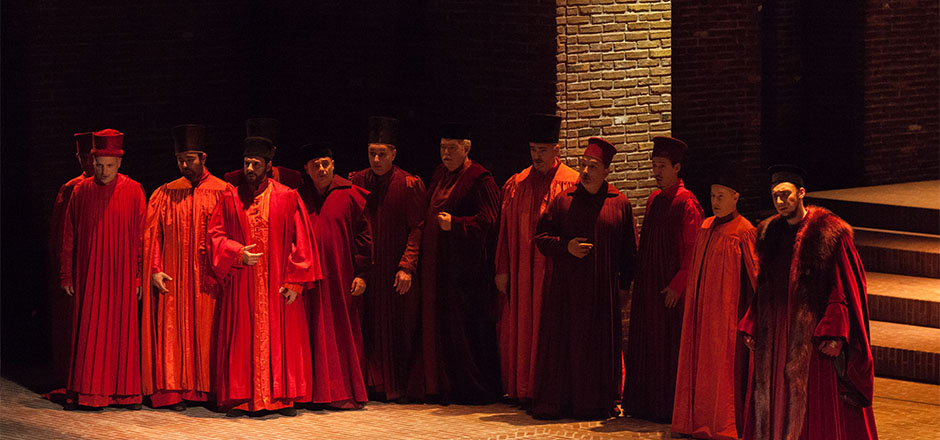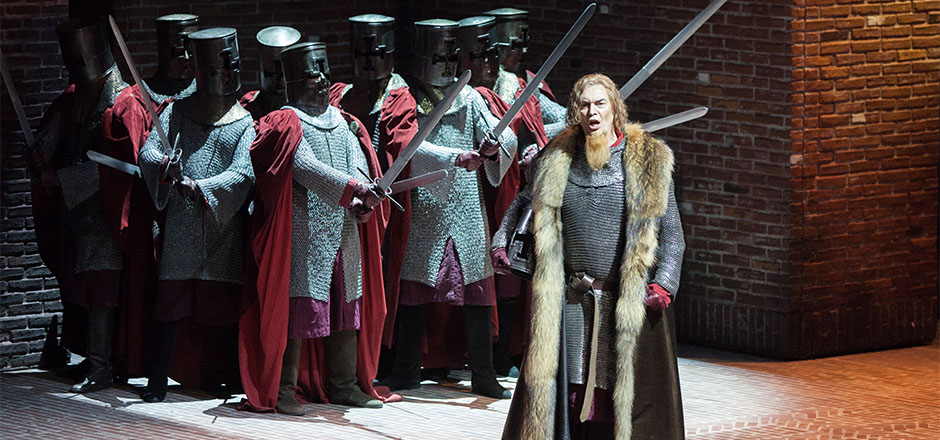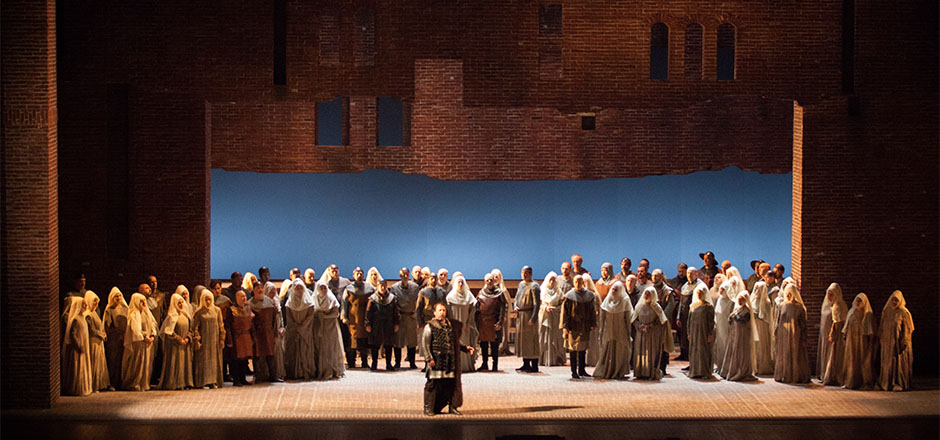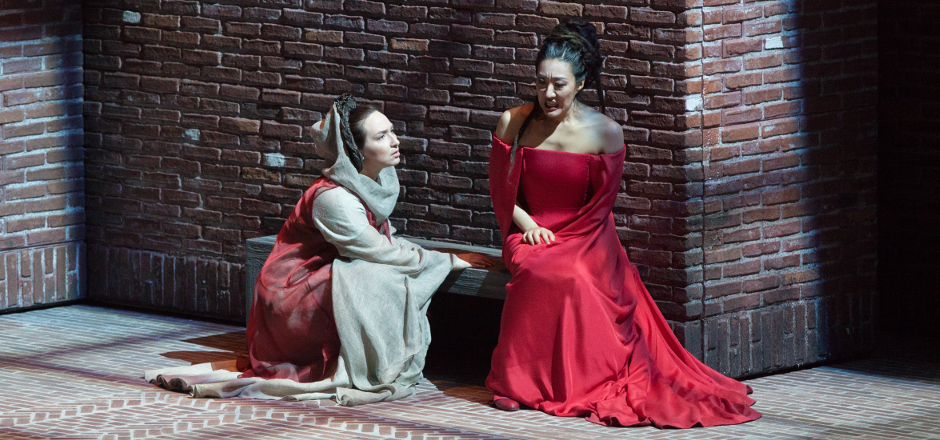LXXXI Festival of the Maggio Musicale Fiorentino
Opera
La battaglia di Legnano
La battaglia di Legnano
La battaglia di Legnano
Tragedia lirica in quattro atti
Libretto di Salvatore Cammarano tratto da La Bataille de Toulouse di Joseph Méry
Musica di Giuseppe Verdi
Prima rappresentazione: 27 gennaio 1849 al Teatro Argentina di Roma
Nuovo allestimento
Artists
Conductor
Renato Palumbo
Director
Marco Tullio Giordana
Assistant director
Boris Stetka
Scenography and Light designer
Gianni Carluccio
Assistant scenography
Sebastiana Di Gesù
Costumes
Francesca Livia Sartori and Elisabetta Antico
Choir director
Lorenzo Fratini
Orchestra and Choir of the Maggio Musicale Fiorentino
Renato Palumbo
Director
Marco Tullio Giordana
Assistant director
Boris Stetka
Scenography and Light designer
Gianni Carluccio
Assistant scenography
Sebastiana Di Gesù
Costumes
Francesca Livia Sartori and Elisabetta Antico
Choir director
Lorenzo Fratini
Orchestra and Choir of the Maggio Musicale Fiorentino
Federico Barbarossa
Marco Spotti
Rolando
Giuseppe Altomare
Lida
Vittoria Yeo
Arrigo
Giuseppe Gipali
Imelda
Giada Frasconi
I Console
Egidio Massimo Naccarato
II Console
Nicolò Ayroldi
Marcovaldo
Min Kim
Podestà
Adriano Gramigni
Uno scudiero / Un araldo
Rim Park
Marco Spotti
Rolando
Giuseppe Altomare
Lida
Vittoria Yeo
Arrigo
Giuseppe Gipali
Imelda
Giada Frasconi
I Console
Egidio Massimo Naccarato
II Console
Nicolò Ayroldi
Marcovaldo
Min Kim
Podestà
Adriano Gramigni
Uno scudiero / Un araldo
Rim Park
ACT I (He lives!)
Scene 1
Piazza of Milan. Numerous contingents of the Lombard League have gathered in support of the campaign against Frederick Barbarossa: amid the general rejoicing, the soldiers acclaim the upcoming victory of the League. Among the Veronese soldiers is Arrigo, who encounters his comrade-in-arms Rolando, the leader of the Milanese troops. The two friends exchange an amazed greeting: the news had spread that Arrigo had died in the siege of Susa; instead, wounded, he had been transported to his mother in Verona and nursed back to health. Their conversation, however, is interrupted by the arrival of two consuls who will command the army and all swear allegiance to the new cause.
Scene 2
Shady place near the city walls. Rolando's wife Lida, is lost in melancholy thoughts. When her maidservants ask her why she does not participate in the general rejoicing, Lida replies that she loves her country, but hates war, which has taken the lives of her parents and brothers. Many times she has wished to die, but, being a wife and mother, she has resolved to do her duty. Imelda, Lida's handmaid, enters to announce that Rolando has returned, and Arrigo is with him. "He lives!” Lida exclaims, whose sudden joy arouses suspicion in Marcovaldo, the German prisoner who has fallen in love with her. Rolando enters and introduces Arrigo to his wife. The two barely manage to contain their emotions, increasing Marcovaldo’s doubts. Rolando, who has not noticed anything, tells his wife that Arrigo will be their guest. Marcovaldo and the handmaids exit followed immediately by Rolando (summoned to a council of war), leaving Arrigo and Lida finally alone. Arrigo is furious that Lida has married another after having sworn him eternal loyalty but she explains her reasons: convinced that Arrigo was dead, she married Rolando to obey the wishes of her dying father. But the young man refuses to forgive her and flees in anger.
ACT II (Barbarossa)
The town hall of Como. The magistrates and town elders of Como are gathered in council: they have heard that Milan has been forced to make a pact with Barbarossa and take pleasure in the defeat of a rival city. Rolando and Arrigo arrive as delegates of the Lombard League. Rolando explains the situation: a new imperial army has descended along the Adige river and is currently being held in check by the Veronese; Barbarossa is in Pavia and must be prevented from joining with them; only Como can block their way, using the natural defenses of their lake. But the town elders tell them they have made an agreement with Barbarossa. Rolando and Arrigo react vehemently, accusing Como of being traitors and murderers of their brothers. Suddenly Barbarossa appears in person: to the two reckless men he indicates his mighty armies already lined up on the surrounding hills. He then orders Rolando and Arrigo to bring this message to the Lombards: Milan will be destroyed a second time and he is "Italy's great destiny". Arrigo and Rolando reply that the imperial mercenary troops will be defeated by people fighting for freedom and proclaim the greatness of Italy.
ACT III (Infamy)
Scene 1
Vaults of the church of S. Ambrogio. The Knights of Death have come to renew their solemn commitment: to win or die. Arrigo arrives, asking for a place in the forefront of their lines. Before they disperse, they solemnly swear to put an end to the woes of Italy, and drive the tyrants back beyond the Alps.
Scene 2
Apartments in Rolando’s castle. Lida, who has learned of the oath of death pronounced by Arrigo, is plagued by a strong sense of guilt; she decides to write him a letter, which she gives to Imelda, to whom she has confessed everything. Rolando arrives to embrace his son and wife before leaving for the battle: it is certain that they will win, but at the price of much blood. Lida exits with the child and Arrigo enters, summoned by Rolando. The latter, who is unaware of the oath made by his friend, knows that he will have to conduct a surprise attack against Barbarossa's army, while Arrigo will remain in the rear to defend Milan: he will then entrust his family to him if he dies in battle. Arrigo, moved, hugs him, then leaves. Marcovaldo arrives having intercepted Lida's letter and shows it to Rolando; imagining an intrigue of love between Arrigo and his wife, Rolando furiously swears to take revenge.
Scene 3
Room in the tower of Rolando's castle. It is nighttime and Arrigo is writing a farewell letter to his mother, when Lida stealthily enters to try to dissuade him from his desperate feat. He replies that his life is over since she has ceased to love him. Lida confesses that she still loves him but that they will have to live apart, she for the sake of her son, and he for that of his mother. Suddenly there is a knock on the door; hearing Rolando's voice outside, Lida hides on the balcony. Rolando enters and tells Arrigo that he knows about his vow and that if he wants to join the Company of Death, he must leave immediately. Arrigo objects that it is still night, but Rolando, in pointing out that day has already dawned, opens the shutters and discovers Lida. To the stammered excuses from his wife and Arrigo, Rolando reacts furiously, condemning their betrayal. Arrigo begs for death, but Rolando thinks of a worse punishment: the infamy of losing his honor. He then exits quickly, bolting the door behind him, while the sounds of the battle already resound from outside. Imprisoned, Arrigo hears the Company of Death pass under the balcony and, in desperation, throws himself from the balcony into the moat, while Lida falls unconscious.
ACT IV (Dying for the homeland!)
Piazza of Milan. Imelda and Lida are among the crowd kneeling in prayer. From inside the church a chorus of monks is heard singing a psalm. Imelda whispers to her mistress that Arrigo was seen unharmed coming out of the river and reaching the troops. In the distance are heard the sounds of trumpets and voices proclaiming victory. The consul announces that the Lombard League has won and that Barbarossa was killed by the Veronese, Arrigo. Everyone rejoices at the victory: Italy is free. But amid the celebrations a funeral procession enters bearing Arrigo who is mortally wounded. His body is placed on the steps of the church: with his last breath he tells Lida and Rolando swearing on the sacred homeland that Lida is without guilt and pure as an angel. Rolando, moved, believes his words: those who die for their country cannot be guilty. Arrigo asks for the banner waving on the Carroccio, then kisses the flag and dies.
La città sotto assedio, mura annerite dal fuoco, campagne ridotte a monchi alberi senza foglia. Atri muscosi, fori cadenti, gli stessi dell’Adelchi manzoniano di quattro secoli prima. Lo stesso volgo disperso. Che repente si desta, intende l’orecchio, solleva la testa. La battaglia di Legnano ha per Verdi lo stesso significato patriottico che l’ultimo re longobardo ha per Manzoni. La rivolta contro l’invasione straniera e la formazione di una rete di Comuni alleati, i prodromi di un’identità, la formazione di un esercito e, soprattutto, di un popolo che lo sostiene. Tanto bastava per trasportare la vicenda nel Vietnam delle ultime decadi del Novecento o durante la lotta di Liberazione di cinquant’anni prima? O nei Balcani di quest’inizio millennio? Non irrido alle riletture “moderne”, in qualche caso anche coinvolgenti, ma preferisco che lo spettatore – che per me è innanzi tutto ascoltatore – possa far rima da solo con la contemporaneità. Se proprio vuole altro che non la Musica. La mia personale scommessa è ricavare la “contemporaneità” attingendo direttamente al verbo dell’Autore, rispettandone alla virgola le indicazioni (tra l’altro, in Verdi precise, inequivocabili). Non è chiarissimo in quei milanesi, comaschi, piacentini, novaresi, vercellesi, veronesi, uniti tutti contro il Barbarossa, il desiderio di liberarsi da un giogo e ritrovare la propria sovranità? Ricucire contrasti e spaccature, ricreare senso e forma di collettività, superando ognuno il nostro particulare? Sono temi che ricorrono nella storia del nostro Paese, tornati oggi di estrema attualità. Ne La battaglia di Legnano lo sfondo patriottico, che fece la sua fortuna al debutto e la mise in un angolo negli anni successivi (colpa anche delle riscritture obbligate dalla censura codina) è per me di vitale importanza. L’antico mondo barbarico fatto di obblighi e servitù si muove, detta l’evoluzione verso un equilibrio nuovo. L’età dei Comuni è la nuova frontiera; il diverso rapporto fra città e campagna e lo sviluppo del commercio ne saranno i frutti principali. A difenderli una plebe in armi, anziché mercenari chiamati da fuori e pronti a vendersi. Questo lo sfondo. Poi i caratteri, come sempre sbalzati da Verdi in altorilievo: Rolando, Arrigo, Lida, Barbarossa, Imelda, Marcovaldo. Pubblico e privato mescolati, nessun destino fuori dalla Storia, sacrificio e rito di sangue necessari perché il Fato si compia e torni il sole a splendere sulle sciagure umane. La scelta di rispettare l’epoca e le sue date appare, subito dopo l’Allegro Marziale Maestoso della Sinfonia che apre l’opera, si dichiara fin dall’apertura del sipario su una delle prime mappe della città di Milano (1.158, l’azione è di due decenni successiva: 1.176). La scena di Gianni Carluccio evoca i materiali costruttivi del tempo - mattoni, legno, pietra – cercando più gli spazi di un’installazione piuttosto che configurare l’ambiente in modo realistico. Anche i costumi di Francesca Sartori ed Elisabetta Antico puntano alla stilizzazione cercando nei colori e in pochi accessori il carattere e le differenze dei vari personaggi. Grande differenze invece per i due eserciti: i lombardi popolani e “straccioni”, i teutoni protetti da metallo smagliante, macchine da guerra professionali e, sulla carta, invincibili.




